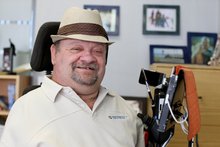
Barry de Geest, one of NZ's best known thalidomide victims.Photo / File
It was one of the epic tragedies of the mid-20th century: babies born
without arms and legs, sometimes deaf or blind, sometimes with brain or heart
damage - all because their mothers were nauseated or sleepless during their
pregnancies and given Thalidomide to ease their symptoms.
While the drug was banned in 1962, it is again being prescribed - this
time for treatment for multiple myeloma and other blood cancers - which its
victims, now entering old age, often destitute and in increasing pain, find
difficult to accept. "In my life of conscience and effort and survival,
there is nothing redeeming about Thalidomide," said Boothe Berrisford, a
52-year old Thalidomide survivor.
While he is only one of 26 named American
victims, Berrisford is far from alone. There are an estimated 6,000 Thalidomide
survivors still living, mostly in Australia, Canada and Europe because it was
never approved for use in the United States, although 20,000 women there were
given the drug in clinical trials.
When the German company that made Thalidomide formally apologised to
victims last month after 50 years of silence, the response was anger, given the
company's resistance to increasing or broadening compensation to victims. Melbourne
woman Lynette Rowe, who was born without limbs, is leading an Australian class
action lawsuit against the drug's manufacturer, Grunenthal, which fought to
have the case heard in Germany.
This year the Victorian Supreme Court dismissed Grunenthal's
application, and the case was heard in Australia. It has been reported that
more than a hundred Australian Thalidomide survivors are involved in the class
action. In July, Rowe was awarded an out-of-court settlement, believed to be in
the millions of dollars and paving the way for class action victims to receive
further compensation. But for those suffering from multiple myeloma, or
leprosy, the modern form of Thalidomide represents something akin to hope. For
reasons not completely understood, the same mechanism in Thalidomide that
stopped healthy cell growth in foetuses also inhibits the growth of cancer
tumours.
In the US, Thalidomide is trademarked as Thalomid by manufacturer
Celgene, which has also been developing newer versions of the drug with fewer
side effects. But Thalidomide remains controversial. "This is not a wonder
drug. Aspirin is a wonder drug," said Barry Gold, professor and chair of
the department of pharmaceutical sciences at the University of Pittsburgh's
School of Pharmacy. As a cancer treatment, "I don't think it has a great
deal of promise," he added. "It doesn't cure multiple myeloma and
doesn't always work in those suffering from the disease, and (it) can produce
bad side effects."
If there is any silver lining to the Thalidomide scandal, it's that it
became a watershed for how drugs are regulated. Despite severe pressure from
pharmaceutical companies to market Thalidomide, Frances Kelsey, the first
female head of the US Food and Drug Administration, resisted and then refused
permission after irrefutable evidence emerged of its links to horrific birth
defects. Mothers who took the drug in the first trimester of pregnancy gave
birth to children with deformations such as phocomelia - absence of the arm
with hands like flippers extending from the shoulders, as well as malformed and
in some cases missing arms and legs.
In 2006, Thalidomide was approved for use as a therapy for newly
diagnosed multiple myeloma patients, and another version of the drug, Pomalidomide,
is about to be approved, said John Lister, division director for Hematology and
Cellular Therapy at West Penn Allegheny Health System. Lister uses Thalidomide
to treat multiple myeloma and other blood cancers. "It has fewer side
effects but they exist nonetheless," he said, citing sleepiness,
peripheral neuropathy and a decrease in white blood cell counts. And while
birth defects are always a concern, the newer versions of Thalidomide aren't
used on patients who are very young, he added. Berrisford is unpersuaded.
Thalidomide continues to reveal pernicious effects on survivors, and the
compensation fund established in the UK isn't nearly enough to see these
victims into old age. Thalidomide "was a terrible invention that caused
untold amounts of physical and emotional damage," Berrisford said.
"... While I understand the desperation and need of those afflicted with
cancer, I will never be able to accept that a drug with Thalidomide's record is
still a viable solution to anything."
NZ Herald
Please share
No comments:
Post a Comment